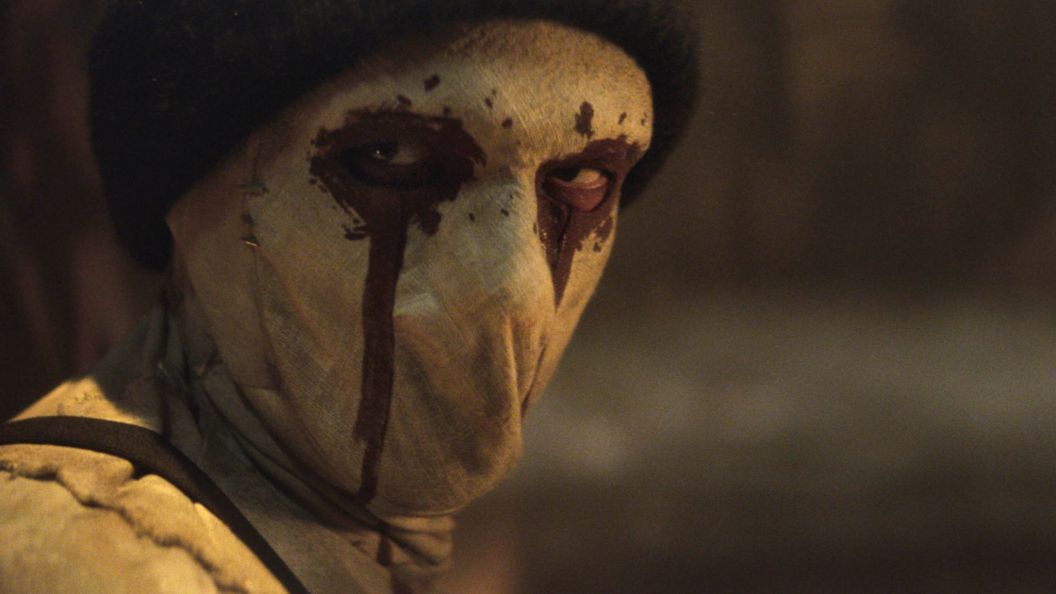
Image courtesy of Marvel StudiosSince its premiere, Daredevil: Born Again has methodically built tension around its mysterious antagonist Muse, first teased through the detailed murals he painted all over New York City. As weeks went by, fans learned that Muse’s graffiti was crafted using the blood of his victims, turning the artwork into horrific crime scenes that perplex authorities and terrify citizens. Taking advantage of this growing public fear, Mayor Wilson Fisk (Vincent D’Onofrio) has strategically leveraged the situation to advance his anti-vigilante agenda, establishing a controversial Task Force specifically designed to bring down masked criminals.
The slow-burn approach to revealing Muse culminated in Episode 6, which finally brought the villain face-to-face with Matt Murdock (Charlie Cox).In Episode 6, Matt donned his Daredevil costume for the first time since Foggy Nelson’s death to rescue Angela Del Toro (Camila Rodriguez) from becoming Muse’s latest victim. While this confrontation showcased Muse’s unexpected combat prowess, allowing him to temporarily hold his ground against the Devil of Hell’s Kitchen before escaping, Episode 7 significantly expands the character’s mythology by revealing a detailed backstory.

Unfortunately, this creative decision undermines much of what made the villain so effectively disturbing in Marvel Comics.WARNING: Spoilers below for Daredevil: Born Again Season 1, Episode 7The seventh episode of Daredevil: Born Again peels back Muse’s mask to reveal his true identity as Bastion Cooper (Hunter Doohan), a young man born into immense privilege but raised under the stifling expectations of demanding parents. Through a series of revealing conversations with Dr.
Heather Glenn (Margarita Levieva), we discover that Bastion was forced to train in taekwondo from an early age and eventually competed professionally, despite harboring no passion for martial arts whatsoever. This parental pressure to become an athlete directly conflicted with his genuine desire to pursue art, creating a deep-seated resentment that festered throughout his formative years. Interestingly, this forced athletic training inadvertently explains Bastion’s physical capabilities, particularly how he could credibly challenge Daredevil.
Image courtesy of Marvel Studios[RELATED: All 7 MCU Daredevil Appearances Ranked (Including Born Again)]Further complicating his backstory, Daredevil: Born Again reveals that Bastion was committed to mental health institutions multiple times throughout his life, though the exact nature of his psychological issues remains ambiguous. In perhaps the most disturbing revelation, Bastion directly credits Heather’s psychological work — specifically her books and therapy techniques — with helping him “unlock” his true nature and embrace his Muse persona. This creates a dark irony wherein Heather’s professional efforts to help people confront their trauma inadvertently inspired Bastion to transform into a serial killer who views murder as the ultimate form of artistic expression.
While this elaborate origin effectively serves the series’ narrative purposes by creating a direct connection between Muse and Heather, it simultaneously strips away the enigmatic quality that made him such a compelling villain in Marvel Comics. Muse’s Unknown Origin Is What Makes Him Scary in Marvel ComicsImage courtesy of Marvel ComicsMuse’s comic book incarnation, created by writer Charles Soule and artist Ron Garney during their acclaimed Daredevil run in 2016, maintains an impenetrable air of mystery around the character. Introduced in Daredevil #11, the comic version of Muse is never given a real name, history, or clear motivation beyond his twisted artistic vision.
Readers never learn where he came from, how he acquired his abilities, or what psychological factors drive his murderous artistic expression. This deliberate withholding of information wasn’t a narrative oversight but a calculated creative decision that heightened the character’s disturbing impact.The comic book version of Muse’s lack of explanation makes his artistic expressions even more disturbing, because they exist without a familiar psychological framework.
There’s no childhood trauma or parental pressure to explain away his actions. Muse’s art is pure, inexplicable horror, forcing readers to confront the uncomfortable possibility that some evil cannot be neatly categorized or understood.By revealing Muse to be essentially a troubled rich kid with parental issues and mental health struggles, Daredevil: Born Again transforms him from an unknowable force of nature into a somewhat predictable villain archetype we’ve seen countless times before.
His disturbing art installations and the systematic murder of dozens of victims lose much of their abstract horror when re-contextualized as the actions of someone with such a familiar psychological profile. The episode further damages his mystique by giving Muse a standard villain monologue where he explicitly explains his motivations to Heather while holding her captive. By the time the episode reaches its climax, with Heather shooting Muse to death, the character has been thoroughly demystified and rendered surprisingly conventional for someone who had a terrifying presence in previous Daredevil: Born Again episodes.
New episodes of Daredevil: Born Again premiere on Disney+ every Tuesday.Do you think Muse’s MCU backstory enhanced or diminished the character? Join the discussion in the comments!The post Daredevil: Born Again Gave Muse an Origin Story (And That’s a Mistake) appeared first on ComicBook.com.
.















